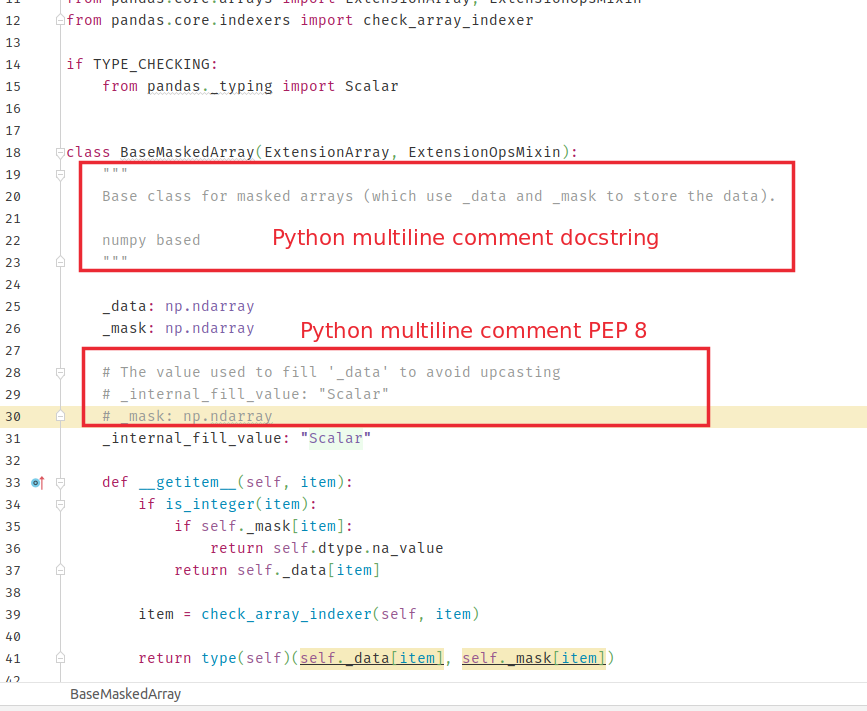Pycharm Continue Docstring to Next Line
Python has several ways to comment multiple lines in Python. One option is to add # at the start of each line. PEP 8 and bigger part of the community prefers to comment out like:
# This is a comment # with multiple lines instead of:
""" This is a comment with multiple lines """ Multiline comments in Python can start with ''' and end with ''' . Multiline comment is created simply by placing them inside triple-quoted strings: '''/""" and '''/""".
Both examples have valid syntax in Python.
In Python there is a special symbol for comments which is # . Some languages like Java have native support for multiline comments.
Python multiline comment would look like to:
# This # is a # multi-line # comment This is the default comment for most popular Python IDEs like PyCharm, Sublime, VS code.
Guido van Rossum (the Python creator, Python BDFL) tweeted once a "pro tip" for Python multiline comments:
@BSUCSClub Python tip: You can use multi-line strings as multi-line comments. Unless used as docstrings, they generate no code! :-)
According to this tip you can do comments in this way:
"""line1 line2 line3""" '''line1 line2 line3''' What is a docstring? The first statement in a class, method, function or module definition which is a string is called a docstring. Example:
def is_palindrome(word): """Check if word is a palindrome.""" str(word) == str(word)[::-1] Note 1: Even if a docstring contains only one line, triple quotes should be used because it's easier to expand it in future.
Note 2: For one liners it is recommended the quotes to be on the same line as the comment.
Multiline docstrings example
Descriptive multiline docstrings help for understanding and maintaining the code. Here you can find an example for such:
def complex(real=0.0, imag=0.0): """Form a complex number. Keyword arguments: real -- the real part (default 0.0) imag -- the imaginary part (default 0.0) """ if imag == 0.0 and real == 0.0: return complex_zero ... Many projects and organizations are using this kind of comments when they want to have good documentation.
The example image below multiline commend and docstring:

For commenting several lines in most popular IDEs you can use next shortcuts.
First you need to select the lines and then press:
- Pycharm - CTRL + / - comment / uncomment
- Eclipse - CTRL + /- comment / uncomment
- Sublime - CTRL + /- comment / uncomment
- Atom - CTRL + /- comment / uncomment
- IDLE - CTRL + ALT + 3 - comment, CTRL + ALT + 4 - uncomment
- Notepad++ - CTRL + Q - comment / uncomment
- vim - CTRL + Q / kbd>CTRL + V - comment / uncomment
- VS Code - CTRL + / - comment / uncomment
Note: If you like to add a multiline docstring than you can use different combination:
- Pycharm - Alt + Enter inside the function and select Insert documentation string stub
- VS Code - Alt + Shift + A - comment / uncomment
The shortcut to comment multiple lines in Python and PyCharm are:
- Windows or Linux: Ctrl + /
- Mac OS: Command + /
To comment several lines of code in the Pycharm follow next steps:
- Select the code lines
- Menu
- Code
- Comment with Line Comment
- Windows or Linux: Ctrl + /
- Mac OS: Command + /
result:
# time.sleep(50 / 1000) # 50 ms # time.sleep(5) # 5 secs # time.sleep(60) # 1 min To uncomment commented lines in PyCharm you can do it by the same steps as commenting:
- Select the code lines
- Menu
- Code
- Comment with Line Comment
- Windows or Linux: Ctrl + /
- Mac OS: Command + /
result:
time.sleep(50 / 1000) # 50 ms time.sleep(5) # 5 secs time.sleep(60) # 1 min Note: If you try to comment mixed lines code and comments then
- the first press Ctrl + / will comment all lines (adding the second comment symbol # # in front of the commented lines)
- the second one Ctrl + / will uncomment all lines (only the first comment sign)
Before
# time.sleep(50 / 1000) # 50 ms # time.sleep(5) # 5 secs time.sleep(60) # 1 min time.sleep(60 * 60) # 1 hour After
# time.sleep(50 / 1000) # 50 ms # # time.sleep(5) # 5 secs # time.sleep(60) # 1 min # time.sleep(60 * 60) # 1 hour You can delete all Python comments from your Python project by(in Pycharm):
- open replace Ctrl + R
- check regex
- use
- single line comment
.*#.*\n * doc string line comment """.*""" * doc string with new lines inside ([^\(\.]"""[^\(]*)""" - replace all with nothing
Demonstration:
remove Python multiline comment.
Finally you can watch video for Python comments in PyCharm:
How to remove/fold all python(java) comments in PyCharm/IntelliJ
Reference
- PEP 8 -- Style Guide for Python Code - Comments
- PyCharm Commenting and Uncommenting Blocks of Code
- PEP 257 -- Docstring Conventions
Source: https://softhints.com/python-multiline-comments-or-how-to-comment-multiple-lines/